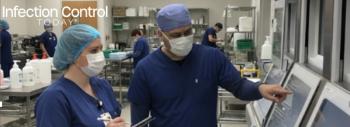
Integrity Inspection/Testing Practices Critical to Preventing Insulation Damage in Sterile Processing

Improper handling of insulated instruments can lead to serious complications, including fatal surgical site infections for patients and staff.
Any shortfalls in any part of the processing of insulated instruments, from the point-of-use processing treatment to the final assembly, can lead to devastating complications from surgical site infections that can be fatal to patients and perioperative personnel. While some of these issues may stem from human error or carelessness, the place to begin searching for ways to prevent damage in the process to the insulation integrity.
Cheron Rojo, BS, FCS, CHL, CIS, CER, CFER, CRCST, spoke with Infection Control Today® (ICT®) at the 2023 HSPA Annual Conference held in Nashville, Tennessee, from May 6-10 about his presentation titled, “Auditing Study of Insulation Testing Practices Aims to Improve Outcomes.” Rojo is the senior clinical affairs specialist for Healthmark Industries.
During his presentation at the HSPA conference, Rojo talked about his study from May 2021 to May 2022 on sterile and nonsterile laparoscopic trays and individual items by type that were insulated. He also discussed the
“The biggest thing out of this [study] is something at the end of this study, [and] in this presentation is a guide….When you're doing your mock surveys, you can use this guide to ask questions and see what the staff use as tools, which is one of the factors I saw [as causing damage to the insulation]."
Another question to ask those in the sterile processing department is whether they understand the damage. “That was another key factor: they couldn't identify basic damage….Another piece that I would love [sterile processing departments] to look at is the repair service. I found that many facilities have bad repair services, and nobody knew. So it was either the current repair service where they overlooked [the damage], but they didn't repair the instruments, and a past repair service didn't repair the instrument correctly.”
Severe accidents happen even if they are not well known. “I caught 3 in the FDA MAUDE report that happened during this study. But there are numerous ones in there, from surgical fires, patients being burned internally, outside the patient’s body, and surgeons and scrub techs being burned," Rojo said. "Remember, everything in the surgical suite, like drapes and gowns, is a combination of paper. So this is a severe issue. I feel like it's not been brought to light. I know the FDA came up with a warning letter in 2018. And now, with the amendments that came out in early 2021 and with these studies that came out in 2019 and 2023, we're going to start bringing it to the forefront of health care workers’ attention. Somebody asked me the other day. “‘How come we don't see it in the news?’ I answered, ‘Well, many of the incidences settle outside of court.’”
Newsletter
Stay prepared and protected with Infection Control Today's newsletter, delivering essential updates, best practices, and expert insights for infection preventionists.




